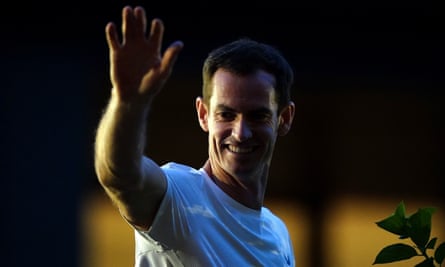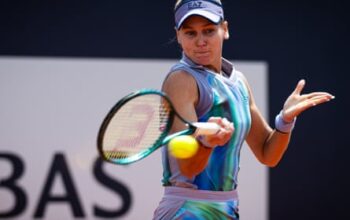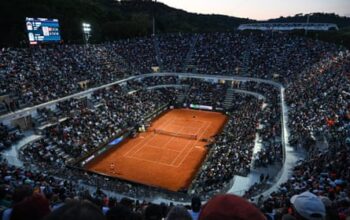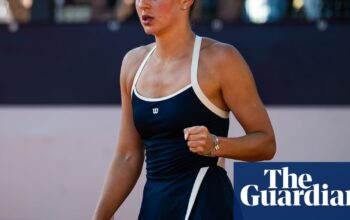It was always going to end in tears, of the very finest kind. And, as hard as he tried, Andy Murray could not entirely resist the lachrymose tendencies that have characterised his emotional career, which moved one game closer to its conclusion on Centre Court on Thursday night.
His brother, Jamie, teared up a little too after they exited the doubles. Maybe more than a few in the crowd did as well, including their parents, and Andy’s wife and children. The press box, as far as I could tell, held firm – but who knows in the advancing darkness that enveloped the court where Murray had won so many great struggles, including two that brought him the title.
In the sometimes turbulent world of doubles, there are few certainties, no easily won fortunes and little glory. But hardcore fans (whose go-to recreational gig it mainly is) love it, and rarely more than they did in the warm evening glow of Centre Court on day four of the championships.
While the usual swag of Thursday two-handers were sprinkled elsewhere across the outside courts – low-key matches watched in clutches largely of families, friends and those who couldn’t get a ticket for the tournament’s grand arena – the Murray boys from Dunblane via Surrey did their thing one more time.
Not often (ever?) do you see a standing ovation for the arrival of contestants in the first round of a doubles match (the first on Centre Court for nearly 30 years). On Thursday night we did. It was accompanied by the sort of throaty, champagne roar that only Wimbledon knows.
But this was not so much a match in a grand slam tournament as the celebration of a tennis dynasty. It was also a goodbye wave from brothers who own 10 majors between them. And, before you scratch your head too hard, it is Murray the elder (Jamie) who has seven of them.
Their Australian foils – Rinky Hijikata and John Peers, a former doubles partner of Jamie’s – did not come to praise them, but bury them, in two fine sets. From the first ball to the last, there was high-class tension.
Courtside, the winners were gracious of the losers. “We knew it was about Andy and the great champion he is,” Hijikita said – as Murray skipped back on to court after a late bathroom break.
Then, pouring schmaltz on schmaltz, Sue Barker, who handed in her Wimbledon microphone two years ago, appeared to say: “All I can say to mum Judy and dad Will is congratulations, you’ve produced two great champions.”
There followed a moving clip of Andy’s career on the big screen and a retrospective of his finest moments, which must have moved a few tear glands around the arena where he had won two of his three majors.
This one started well, enough. On his first visit to Centre Court since he won the mixed title with Martina Hingis seven years ago, Jamie looked very much at home, as did Andy, who has squatters’ rights on his favourite piece of turf – apart from a few tight shots that caught him a split-second off. In the third game of the first set, he reached for his injured back after being stretched on the backhand.
Generally, their reflexes twitched in sweet harmony and the first set hung by a thread until the Scots could do little about the Hijikata forehand that flashed between them after 40 minutes.
They exchanged breaks early in the second set but the Australians looked stronger, younger, fresher. The Murray boys fell back on their smarts, experience and pedigree but, gone 8pm under a blanket of clouds, the gloom was more than metaphorical. The ball was now almost as hard to see as a Murray win.
Andy and Jamie were playing together for the 62nd time (which might surprise casual observers) in front of the adoring crowd, none more appreciative than the 82-year-old former British No 1 Roger Taylor (10 of whose 41 career titles were in doubles). He lives not far from the ground, but no doubt would have travelled much further for such a prized invitation. Many did, such as Mr and Mrs Middleton from Bucklebury in Berkshire. Their daughter, the Princess of Wales, watched from home, still recuperating from cancer.
The Murrays began as a team on the grass of Nottingham in 2006 and last played together in Washington five years ago, having won 36 times and lost 25, a respectable return. It was as Davis Cup partners, though, where they shone most brightly, unbeaten in six matches between 2011 and 2016.

While Andy was always going to concentrate on singles, doubles very early on became Jamie’s preferred route and he has been among the world’s best in the discipline for years, with a variety of partners, although he has slipped to 25 in the rankings this season. Nevertheless, doubles has made him a millionaire over two decades, in large part because he heeded his mother’s advice to carry on after a string of disappointments.
His younger brother (by 17 months) never needed any encouragement to rail against the game’s pitfalls and strains. Quite the opposite. He was here, after all, because he’d driven his body to near breakdown in singles and did not trust his injured back to survive in the opening round against Tomas Machac (who was then bounced twice on to small courts, beat David Goffin in a wondrous five-setter and reappeared in the doubles on Court 15 yesterday; it can be a brutal gig outside the limelight).
At the end, Andy was struggling. Peers served out the match in just under an hour and a half, and that was it … until Murray returns with Emma Raducanu in the mixed doubles on Saturday.
The crowd rose to cheer all of them, although the emptied corporate seats were not a good look. He deserved better.


